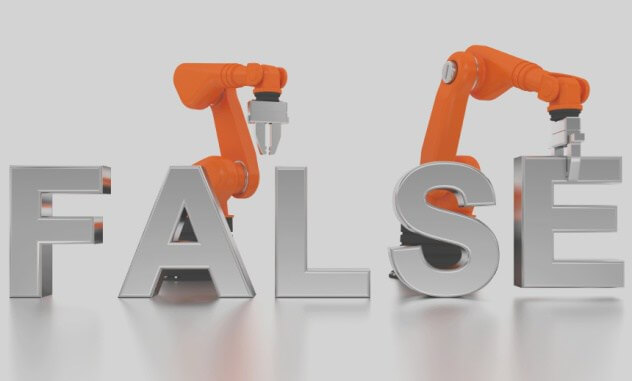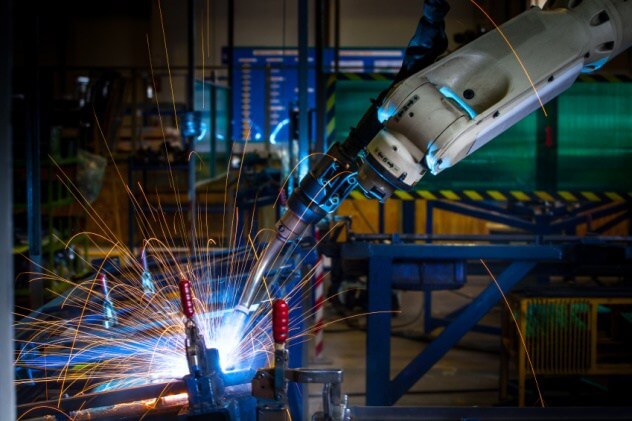- Get link
- X
- Other Apps

Stephen Hawking, Bill Gates, and Elon Musk have something in common, and this is not wealth or intelligence. All of them are afraid of an apocalypse involving AI. This is a hypothetical scenario in which artificial intelligence becomes the dominant form of life on Earth. This may be a rebellion of machines that pretend to be gods or, even worse, decide to destroy humanity and proclaim the Earth their property.
But whether the apocalypse happens with AI is a big question. What prompted reputable and world famous people like Musk and Hawking to publicly voice their concerns about this hypothetical scenario? Could Hollywood movies like Terminator turn out to be prophetic? Let's find out why many people, known for their authority and trustworthy, are concerned about the uprising of the machines and why this is already happening. In part.
They learn to lie and cheat

Lying is universal behavior. People do this all the time, and even some animals, like squirrels or birds, resort to it for survival. However, humans and animals are not limited to lies. Scientists from the Georgia Institute of Technology have developed robots with artificial intelligence that can deceive and lie. A research team led by Professor Ronald Arkin hopes the military will be able to use their robots in the future.
After they are completed, robots will be able to speak with the military on the battlefield. They will act as guards, protecting ammunition and supplies from enemies. By exploring the art of lying, these AIs will be able to “gain time until reinforcements arrive,” by changing patrol strategies to trick other intelligent robots or humans. Well, in any case, scientists plan it.
True, Professor Arkin admitted that there are “significant ethical issues” regarding his research. If the results of his work fall into the wrong hands, it will be a disaster.
They begin to take our jobs.

Many of us are afraid that AI and robots will kill everyone, but scientists say that we should worry about something less terrible - that machines will destroy our jobs. Some experts worry that advances in the field of artificial intelligence and automation can lead to the fact that many people will lose their jobs - they will be taken away by cars. In the United States alone, over 250,000 robots do work for people — and how many will be in eastern countries that produce 90% of the world's technology? And the numbers are growing annually.
Not only workers worry that machines will take away work from people; AI experts are also worried. Andrew Ng of the Google Brain Project and chief scientist Baidu (Chinese equivalent of Google) expressed concern about the dangers of developing artificial intelligence. AI threatens us because it can do "almost everything better than anyone else." Even playing go.
Dear institutions have also released studies reflecting this problem. For example, Oxford University conducted a study according to which in the next 20 years 35% of jobs in the UK will be under the control of AI.
They become smarter than hackers among people

In Hollywood movies, hackers look cool. In real life - ahem, no. They are just guys who are sitting at their devices, typing intently, always tired and with an eternal cup of coffee.
In real life, hacking can be boring, but in bad hands it is a dangerous tool. Even more dangerous is the fact that scientists are developing extremely advanced AI systems to deal with "bad hackers." In August 2016, seven teams took part in the DARPA Cyber Grand Challenge. The purpose of this competition was to come up with a reasonable AI for hacking, which could hit the vulnerabilities of enemies and at the same time find their own weaknesses, "protecting their performance and functionality."
And although scientists develop hackers in the face of AI for the common good, they acknowledge that in the wrong hands their superintelligent systems will wreak havoc and destruction. Imagine what will happen if the superintelligent AI gains control of autonomous hackers. People will be helpless.
They begin to understand our behavior.

Facebook is undoubtedly the most influential and powerful social media platform today. For many of us, but more so for the Western world, it has become an integral part of our daily routine, like food. Whenever we use this social network, we unconsciously interact with artificial intelligence. During a visit to Berlin, Mark Zuckerberg explained how Facebook is developing artificial intelligence to understand our behavior.
Trying to understand how we behave or “interact with elements” when visiting Facebook, AI makes recommendations about what might be interesting to us or would correspond to our preferences. Zuckerberg talked about his plans to develop an even more advanced AI for areas such as medicine. Now Facebook AI can only recognize patterns and learn, but in the future, as Facebook hopes, scientists will create a reasonable AI that can learn new skills and improve themselves. And this will either improve our life or become our latest invention.
They will replace us lovers
Many Hollywood films, from recent ones - “From the Car” and “She” - took as the basis the idea that people fall in love and have sexual relations with robots. Is this possible in real life? Answer: yes, and very soon. Dr. Ian Pearson, a futurologist, suggested in 2015 that sex with robots would become more common than sex with people by 2050. Dr. Pearson has partnered with Bondara, one of Britain’s leading sex shops.
In his report, there are other forecasts: by 2025, very wealthy people will have access to some form of robots for sex with artificial intelligence. By 2030, everyone will participate in some form of virtual sex in much the same way that pornography is watching today. By 2035, many people will have sex toys that will promote sex in virtual reality. And by 2050, sex with a robot will become the norm.
Of course, many people are against sex with smart robots. Kathleen Richardson, for example, believes that sexual relationships with cars will set the bar for unrealistic expectations, and this will negatively affect attitudes toward women.
They are becoming more like people.

This is Yang Yang, an artificial intelligence machine that will shake your hand cordially and embrace you warmly. Yan-Yan was developed by Hiroshi Ishiguro, a Japanese robot expert, and Song Yan, a Chinese professor of robotics. Yang-Yang is similar to Song Yang, and is named after her daughter.
Yang-Yang is not the only robot that looks terribly human. The Singapore University of Technology in Nanyang has also developed its own version of such a robot. The video below shows Nadine, an artificial intelligence robot who works at the university. In addition to being an attractive brunette with beautiful hair and delicate skin, Nadine can smile, greet and meet people, shake hands and maintain eye contact. She can even recognize guests and maintain conversations with them based on previous conversations.
They start to feel

What makes humans different from robots? Think intellect? Nope. AI is much smarter than us. Appearance? Nope, scientists have developed robots that are very similar to humans. The only thing that remains distinctive about us is our ability to experience emotions. Unfortunately, many scientists are working to take away from us this unique feature.
Experts from the Microsoft Application and Services Group in East Asia have created an artificial program that can “experience” emotions and talk to people “humanly”. An AI named Xiaoice answers questions like a 17 year old girl. If she does not know the topic, she can lie. If she is caught lying, they will get angry or embarrassed. Xiaoice can be sarcastic, suspicious and impatient - these qualities are well known to us all.
The unpredictability of Xiaoice makes communicating with her very similar to communicating with a person. So far, such an AI is a curiosity, and the Chinese communicate with it when they want to have fun or when it is boring. But its creator is working on improving Xiaoice. Who knows, maybe Xiaoice will become Skynet's grandmother.
They will get into our heads soon

Wouldn't it be nice to learn French in a couple of minutes just by loading it into your brain? The impossible can become possible in the near future. Ray Kurzweil, a futurologist, inventor and CTO of Google, predicts that by 2030, "the nanobots implanted in our brains will make us god-like." With tiny robots in our heads, we can receive and remember any information in a matter of minutes. We can archive our memories and thoughts and even send and receive letters, photos and videos directly to our heads.
Kurzweil, who is engaged in the development of artificial intelligence at Google, believes that implanting nanobots in the head, we will be "more people, more unique and even god-like." With the right approach, nanobots will be capable of amazing things like treating epilepsy or improving our intelligence, memory and even “humanity”. Of course, not without potential threats. We don’t even know how the brain works at all, and implantation of nanobots seems a dubious matter. In addition, a vicious AI can gain control over us and make us weak-willed zombies, as in the best conspiracy theories.
They become weapons

In an attempt to curb the "growing military power of China and Russia," the Pentagon has set its budget at $ 12-15 billion for 2017. The US military knows that if they want to be ahead of their enemies, they will have to use artificial intelligence. The Pentagon plans to use billions to develop deep learning machines and autonomous robots, as well as other forms of new technology. I won’t be surprised if in a couple of years the military will release robotic killers on the battlefield.
Using AI during a war can save thousands of lives, but weapons with intelligence and acting independently pose a threat even to their creators. Such weapons can not only destroy enemies, but also innocent people - and will not blink an eye.
Of course, scientists would like to avoid this, therefore, more than a thousand experts from the region who gathered at the International Joint Conference on Artificial Intelligence in Argentina in 2015 signed an open letter calling for a ban on the development of autonomous weapons and the use of AI for military purposes. But what can a letter do. Now we are on the verge of another revolution in the military sphere, and whoever wins it will become the most powerful country in the world and, possibly, will contribute to the extinction of people as a species.
They start to learn the wrong thing.

In an attempt to discourage a possible uprising of machines, scientists are developing new methods that will allow machines to distinguish between right and wrong. In the process, AI will become more responsive and ... human. Murray Shanahan, a professor of cognitive robotics at Imperial College London, believes this is the key to saving people from AI destruction.
Scientists led by Mark Riddle and Brent Harrison from the School of Interactive Computing at the Georgia Institute of Technology are trying to instill the human ethics of AI by literally telling him tales. It sounds simple, but that makes sense. In real life, we tell fairy tales to children, instilling in them human values. AI is like a child now. He really does not know what is right and what is not.
However, there is also a great danger in training AI robots in human values. If you look at the history of mankind, you can find that, despite studying the right and wrong, people are still able to do an indescribable evil. Just look at Hitler and other tyrants at the global level. If people are capable of such evil that it prevents a powerful AI from doing the same?
The article is based on materials .
- Get link
- X
- Other Apps
Comments
Post a Comment